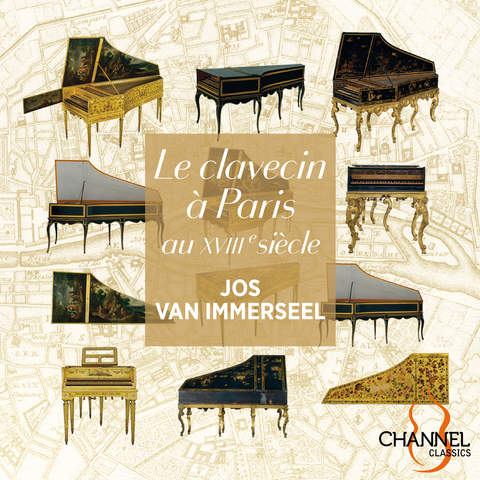Klavecinist Jos van Immerseel speelt werken van zeven Franse componisten op drie verschillende klavecimbels uit het Musée de la Musique of Philharmonie in Parijs.
English version below
Jos van Immerseel (1945) is een bevlogen musicus die in drie dagen tijd (eind 2022, begin 2023) de opnames maakte voor zijn 3-dubbel album Le Clavecin à Paris au XVIIIe Siècle. Een collectie werken vertolkt op drie klavecimbels uit het Musée de la Musique of Philharmonie. Per CD één klavecimbel met werken uit de Franse Barok & Rococo. Respectievelijk voor CD 1: Marchand en Francois Couperin, CD 2: Rameau en Foqueray en CD3: Duphly, Balbastre en Armand Louis Couperin (vader van Francois).
Op Le Clavecin à Paris au XVIIIe Siècle klinkt de solo klavecimbel-muziek van het Parijs uit de 18de eeuw. De hoogtij-jaren van het klavecimbel, zowel als begeleidingsinstrument (Basso Continuo) en als solo-instrument. Voor de opnames reisde Van Immerseel af naar Parijs om ter plekke, in het Musée de la Musique of Philharmonie, de werken te spelen op de klavecimbels gebouwd door Jean-Henry Hemsh in 1761, Andreas Ruckers in 1646 en Jean-Claude Goujon in 1749.
De composities worden innemend vertolkt door Van Immerseel. Fraai zijn de plechtige stukken Francois Couperin die bijna vertellend worden uitgevoerd, tegen de volkse en de meer speelse signatuur in het werk van Philippe Rameau (delen uit Nouvelles Suite de Pièces de Clavecin) waar heel subtiel het folk metier doorheen schemert, dat we ook tegenkomen bij het werk van Jaques Dulphy. Terwijl Claude-Bénigne Balbastre meer op zoek is naar nieuwe harmonische wegen, zoals het gebruik van de bourdon en al een lichte vorm van het Classicisme laat horen.
Jos van Immerseel is een grootmeester op het klavecimbel, maar hij is ook dirigent, pianist, organist en de oprichter van het Collegium Musicum. Een ensemble dat zich richt op het uitvoeren van werken op historische instrumenten. Begin jaren tachtig was hij directeur (samen met Ton de Leeuw) van het Conservatorium in Amsterdam, gaf concerten met Frans Brüggen en werkte samen met o.a. violist Sigiswald Kuijken, cellist Anner Bijlsma en koordirigent Paul Van Nevel.
Met Le Clavecin à Paris au XVIIIe Siècle levert Jos van Immerseel een prachtig document af, waarin hij schittert op drie klavecimbels. De melodische stemvoering, wat een primair onderdeel is van de Franse muziek, komt bijzonder goed tot zijn recht in deze uitvoeringen, waaruit duidelijk blijkt dat Van Immerseel niet alleen de composities omarmt, maar ook grote liefde koestert voor het (historisch) klavecimbel!
English version
Harpsichordist Jos van Immerseel plays compositions by seven French composers on three different harpsichords from the Musée de la Musique of Philharmonie in Paris.
Jos van Immerseel (1945) is an enthusiastic musician who recorded his triple album Le Clavecin à Paris au XVIIIe Siècle in three days (from end of 2022 to beginning of 2023). A collection of works performed on three harpsichords from the Musée de la Musique of Philharmonie. Per CD óne harpsichord with compositions from the French Baroque & Rococo. Respectively for CD 1: Marchand and Francois Couperin, CD 2: Rameau and Foqueray and CD3: Duphly, Balbastre and Armand Louis Couperin (father of Francois).
Le Clavecin à Paris au XVIIIe Siècle features solo harpsichord music from 18th century Paris. The heyday of the harpsichord, both as an accompaniment instrument (Basso Continuo) and as a solo instrument. For the recordings, Van Immerseel traveled to Paris to play the works on the harpsichords built by Jean-Henry Hemsh in 1761, Andreas Ruckers in 1646 and Jean-Claude Goujon in 1749, in the Musée de la Musique of Philharmonie.
The works are charmingly performed by Van Immerseel. The solemn pieces by Francois Couperin are excellent, which are performed almost in a narrative manner, against the popular and more playful signature in the compositions by Philippe Rameau (parts from Nouvelle’s Suite de Pièces de Clavecin), with a kind of popular & folk metier, which we also encounter at the work of Jaques Dulphy. While Claude-Bénigne Balbastre is more in search of new harmonic paths, such as the use of the bourdon and already a sparkling form of Classicism.
Jos van Immerseel is a grandmaster of the harpsichord, but he is also a conductor, pianist, organist and the founder of the Collegium Musicum. An ensemble that focuses on performing music on historical instruments. In the early 1980s he was director (together with Ton de Leeuw) of the Conservatory in Amsterdam, gave concerts with Frans Brüggen and worked with, among others, violinist Sigiswald Kuijken, cellist Anner Bijlsma and choir conductor Paul Van Nevel.
With Le Clavecin à Paris au XVIIIe Siècle, Jos van Immerseel recorded a beautiful document, in which he shines on three harpsichords. The melodic voice leading, which is a primary part of French music, really shines in these performances. This clearly shows that Van Immerseel not only embraces the compositions, but also has a great love for the (historical) harpsichord!
*Jos van Immerseel: Le Clavecin à Paris au XVIIIe Siècle (Channel Classics).
© Mattie Poels.


Geen reacties